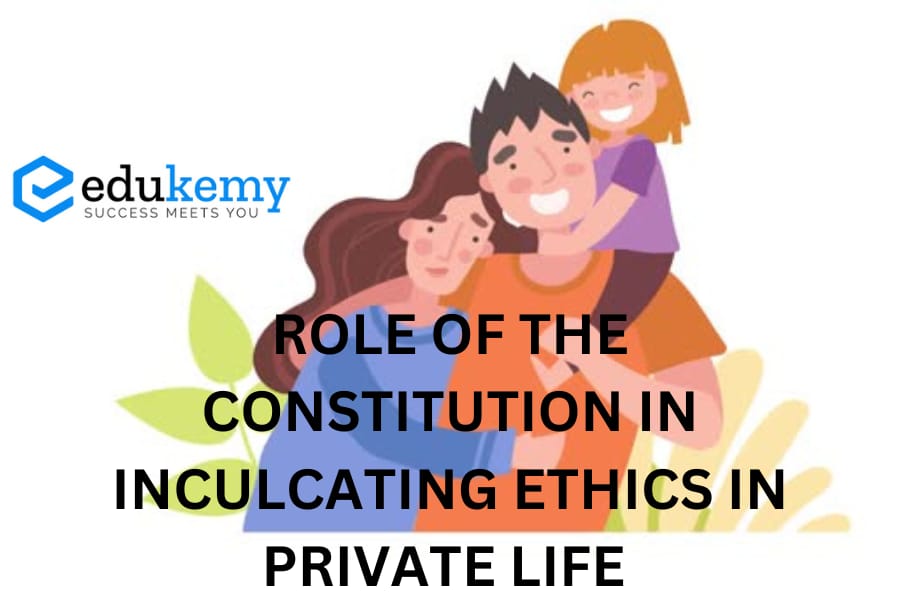
The Constitution serves as the foundational document that outlines the principles, laws, and framework upon which a society operates. While it primarily governs the relationship between the government and its citizens, its influence extends beyond the realm of public affairs into private life as well. The preamble, principles, and provisions within a constitution often reflect the ethical values and moral standards of a society.
The Constitution can inculcate ethics in private life by establishing principles and values that promote ethical
behavior and provide a framework for ethical decision-making. Some of the ways in which the Constitution
does this include:
Contents
Establishing the rule of law:
The Constitution establishes the rule of law as a fundamental principle of the
United States. This means that everyone, including individuals in private life, must follow the law and be
held accountable for their actions. By promoting the rule of law, the Constitution reinforces the ethical
principles of fairness, justice, and equal treatment under the law.
Protecting individual rights:
The Constitution protects individual rights such as freedom of speech, religion,
and assembly, as well as the right to due process of law. By protecting these rights, the Constitution
reinforces the ethical principles of respect for individual autonomy and human dignity.
Creating a system of checks and balances:
The Constitution creates a system of checks and balances among
the branches of government, which helps to prevent abuses of power and promote ethical behavior in
government. By promoting accountability and transparency in government, the Constitution reinforces the
ethical principles of integrity and responsibility.
Establishing a democratic system:
The Constitution establishes a democratic system of government in
which individuals have a voice in the decision-making process. By promoting democratic values such as
participation, equality, and accountability, the Constitution reinforces the ethical principles of fairness and
justice.
FAQs
Q: What is the purpose of a constitution?
A constitution serves as the fundamental law of a nation, outlining the structure of government, delineating the rights and responsibilities of citizens, and establishing the principles upon which the state operates. It provides a framework for governance and ensures the protection of individual rights.
Q: Why is the constitution considered important?
The constitution is essential for several reasons. It establishes the rule of law, limits the powers of government, protects individual freedoms, and provides a mechanism for resolving conflicts within society. It serves as a safeguard against tyranny and provides stability and continuity in governance.
Q: How does the constitution protect individual rights?
The constitution typically includes a bill of rights or similar provisions that enumerate specific rights and liberties guaranteed to individuals. These rights may include freedom of speech, religion, assembly, and due process of law. The constitution also establishes a system of checks and balances to prevent government overreach and protect against violations of individual rights.
Q: Can the constitution be amended?
Yes, most constitutions include provisions for amendment to accommodate changing circumstances or societal values. However, the amendment process is often deliberately rigorous to ensure that changes are made thoughtfully and with broad consensus. Amendments typically require approval by a supermajority of lawmakers or voters, depending on the constitutional framework.
Q: What is the difference between a written and unwritten constitution?
A written constitution is a single document or set of documents that explicitly outlines the framework of government and fundamental principles of the state. Examples include the United States Constitution and the Constitution of India. In contrast, an unwritten constitution refers to a system of government based on precedent, statutes, and conventions rather than a single written document. The United Kingdom, for instance, has an unwritten constitution based on historical documents, judicial decisions, and parliamentary practices.
In case you still have your doubts, contact us on 9811333901.
For UPSC Prelims Resources, Click here
For Daily Updates and Study Material:
Join our Telegram Channel – Edukemy for IAS
- 1. Learn through Videos – here
- 2. Be Exam Ready by Practicing Daily MCQs – here
- 3. Daily Newsletter – Get all your Current Affairs Covered – here
- 4. Mains Answer Writing Practice – here

